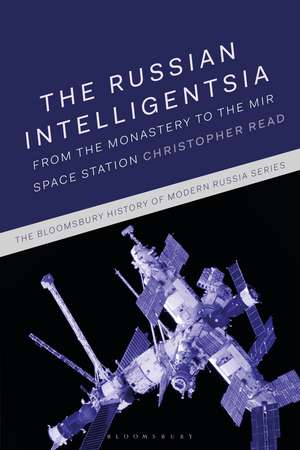The Russian Intelligentsia: From the Monastery to the Mir Space Station: The Bloomsbury History of Modern Russia Series
Autor Professor Christopher Readen Limba Engleză Hardback – 21 feb 2024
Preț: 513.04 lei
Preț vechi: 732.75 lei
-30% Nou
Puncte Express: 770
Preț estimativ în valută:
98.17€ • 104.98$ • 81.85£
98.17€ • 104.98$ • 81.85£
Carte tipărită la comandă
Livrare economică 17 aprilie-01 mai
Preluare comenzi: 021 569.72.76
Specificații
ISBN-13: 9781350035393
ISBN-10: 1350035394
Pagini: 336
Ilustrații: 10 bw illus
Dimensiuni: 156 x 234 x 26 mm
Greutate: 0.65 kg
Editura: Bloomsbury Publishing
Colecția Bloomsbury Academic
Seria The Bloomsbury History of Modern Russia Series
Locul publicării:London, United Kingdom
ISBN-10: 1350035394
Pagini: 336
Ilustrații: 10 bw illus
Dimensiuni: 156 x 234 x 26 mm
Greutate: 0.65 kg
Editura: Bloomsbury Publishing
Colecția Bloomsbury Academic
Seria The Bloomsbury History of Modern Russia Series
Locul publicării:London, United Kingdom
Caracteristici
Contextualises the study by linking the evolution of thought and ideas to social and political change
Notă biografică
Christopher Read is Professorial Fellow in Modern European History at the University of Warwick, UK. He is the author of several books, including War and Revolution in Russia, 1914-22 (2013), Lenin: A Revolutionary Life (2005) and The Making and Breaking of the Soviet System (2001). He is also the editor of The Stalin Years: A Reader (2002).
Cuprins
List of ImagesIntroductionPart I: Origins of the Intelligentsia (to 1860)1. The Origins of the Intelligentsia: Priests, Monks and Moralists2. The Age of Belinsky: Superfluous People and Liberal AristocratsPart II: Politicisation (1860-1890)3. Nihilism: Fathers, Sons and Raznochintsy4. Populism and Feminism: the First StudentsPart III: The High Point of the Intelligentsia (1890 - 1917)5. Marxism: Professional Revolutionaries6. Science: Scholars and Academicians7. Embourgeoisement?: Liberal ProfessionalsPart IV: Science, Sovietisation, Consciousness and Productionism (1917 - 1953)8. The Revolutionary Era: Transforming the Intelligentsia9. The Intelligentsia and Stalin: Engineers of the Soul and Constructors of UtopiaPart V: Has the Intelligentsia survived the Collapse of Communism? (1953 to the Present)10. After Stalin: Dissidents and Reformers11.The Intelligentsia since the Collapse of Communism: Public IntellectualsBibliographyIndex











